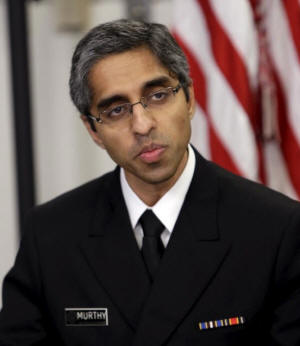|
Surgeon General calls for action to fight
drug, alcohol abuse
 Send a link to a friend
Send a link to a friend
 [November 17, 2016]
By Toni Clarke [November 17, 2016]
By Toni Clarke
WASHINGTON (Reuters) - The U.S. Surgeon
General issued a call to action on Thursday to end what he said was a
public health crisis of drug and alcohol addiction that is both
underappreciated and undertreated.
Dr. Vivek Murthy issued the first-ever Surgeon General's report on
substance abuse and said he hopes it will galvanize work on the issue
the way a similar report 50 years ago sparked decades of effort to
combat smoking.
U.S. deaths from drug overdoses hit a record in 2014, increasing 6.5
percent to 47,055, propelled by prescription painkiller and heroin
abuse, according to the Centers for Disease Control and Prevention.
"The most important thing is, we have to change attitudes towards
addiction and get people into treatment," Murthy said in an interview.
"Addiction is a disease of the brain," he added, "not a character flaw."
The report comes amid a broader government effort to address addiction,
in particular opioid painkiller abuse. President Barack Obama has
requested an additional $1.1 billion to help address the problem.
Opioids include oxycodone, hydrocodone, fentanyl and morphine and are
sold under such brand names as OxyContin, Percocet, Vicodin and Actiq.
In 2015 more than 27 million people in the United States reported using
illegal drugs or misusing prescription drugs. More than 66 million
people, or nearly a quarter of all adolescents and adults, reported
binge drinking within the previous month.

The estimated annual economic impact of drug abuse is $193 billion, the
report states, while the estimated economic impact of alcohol abuse is
$249 billion. Every dollar invested in treatment saves $4 in healthcare
costs and lost productivity and $7 in criminal justice costs, Murthy
added.
The report urges a holistic approach to battling the addiction epidemic
that should involve policy makers, regulators, scientists, families,
schools and local communities.
The goal is to increase access to existing treatment programs, which
Murthy said have been shown to reduce the risk of relapse, while at the
same time expand new and more effective programs.
(Reporting by Toni Clarke in Washington)
[to top of second column] |

Surgeon General Dr. Vivek Murthy appears with U.S. President Barack
Obama (not pictured) in a roundtable discussion on the impacts of
climate change on public health at Howard University in Washington
April 7, 2015. REUTERS/Gary Cameron

Murthy stressed the importance of intervening early through school
programs to discourage early access to alcohol. If a person has
their first drink before the age of 15, their likelihood of
developing an alcohol problem is four times greater than if the
first drink is taken after the age of 21, Murthy said.
The model Murthy hopes to follow is the 1964 Surgeon General's
report on tobacco. At that time 42 percent of the population smoked
but few recognized the danger.
"That Surgeon General's report catalyzed a half century of work on
tobacco control and now the smoking rate is less than 17 percent,"
he said.
Under pressure from lawmakers the Food and Drug Administration
agreed earlier this year to reform its process for approving
opioids. In March it added new warnings to short-acting opioids to
bring information about addiction and abuse in line with that of
long-acting pills. Short-acting pills account for 90 percent of
prescribed opioids.
Murthy's report urges more investment in research and new types of
treatment programs. But he said that shouldn't prevent people from
acting to increase access to existing programs.
"We can't afford not to invest in treatment because we are going to
pay a lot more later," he said.
[© 2016 Thomson Reuters. All rights
reserved.]
Copyright 2016 Reuters. All rights reserved. This material may not be published,
broadcast, rewritten or redistributed.
 |